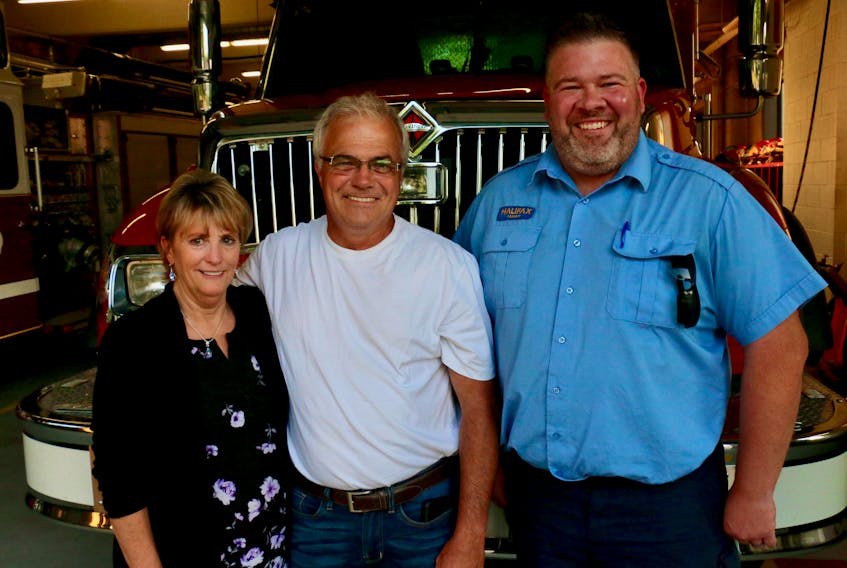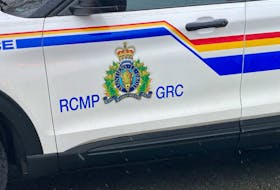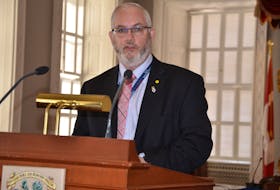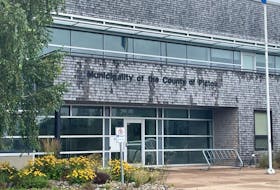WINDSOR, N.S. — June 11 started out as an ordinary day for Eugene Kaizer.
Around suppertime, the Canning resident got inside his Armour 18-wheel truck in Coldbrook and was Halifax bound.
The hours and days that followed, he doesn’t recall. He’s just thankful to be alive.
Kaizer blacked out on Highway 101 and the truck careened off the road, settling in the centre median around what’s referred to as the Mount Uniacke hill — just a few kilometres outside of Sackville. It was around 6 p.m.
As luck would have it, Graham Driscoll, a Halifax Transit bus driver and volunteer firefighter, had just gotten off work and was heading home to Falmouth. He saw the vehicle, which had come to a stop, resting upright, and didn’t appear to be damaged. But his instincts told him to check the scene and make sure everyone was OK. When he arrived, a nurse was in the cab of the truck. Someone was on the phone with 911. Another person was relaying messages between the nurse and the caller.
Kaizer wasn’t breathing.

Driscoll helped haul Kaizer out of the truck and passersby helped carry him up the embankment to the side of the road.
“There was actually quite a few people on scene but I distinctly remember the female nurse, a male who identified himself as an ER nurse and a female paramedic who was off duty,” said Driscoll, who started CPR and worked on Kaizer, taking turns with the medical responders until Halifax Fire and EHS arrived.
It was estimated Kaizer was given CPR for about 20 minutes.
Meanwhile, a coworker of Kaizer’s spotted his truck off the road and Kaizer’s wife, Ann, was notified. She began the long, panicked drive to the hospital. She learned he had been stabilized, but due to the lack of oxygen, she said the doctors weren’t sure if he’d recover.
“They kept him cooled down for 24 hours and then they warmed him back up and he was able to breathe on his own and he was able to answer some commands so we knew that he had some function,” said Ann.
“For the first few days, his short term memory wasn’t very good. Somebody would come in and 10 minutes later he wouldn’t know they were there. That’s gotten better now and it’s pretty much back to normal,” said Ann, dabbing away tears from the corners of her eyes.
“They don’t know what happened to him. They can’t understand what happened. He hasn’t got any blockages; he doesn’t have any damage; he doesn’t have anything that should stop his heart.”

Kaizer was fitted with an implantable cardioverter-defibrillator, which can correct most life-threatening cardiac arrhythmia, so that if something similar were to happen in the future, it could help him immediately.
The Kaizers say one theory that was floated around by doctors was that his issue may have been caused by a spasm in his artery.
But they may never know for sure.
After learning her husband was on the mend, she wanted to reach out to those who were involved at the scene. A little more than a week after the initial incident, Driscoll reunited with Kaizer, this time in the hospital.
“I’m very thankful, very thankful. These guys are miracle workers. They did an awesome job. It was a perfect storm,” said Kaizer, looking over at Driscoll weeks after the incident.
“It was right time, right place, right training,” said Driscoll.
“We have the credentials, we have people who do this for their living or for their volunteering but we weren’t in those settings so we didn’t have our tools of the trade. We had what we know and trained with, which is CPR,” Driscoll said.
“To hear that the CPR training that you have has made a difference, it just goes to really hammer home the importance of it for anyone.”
The Kaizers concur. They hope more people will learn the basics and will be willing to stop and help when people are in need. In their case, it resulted in saving a life.
“There are definitely still good people out there,” Ann said.
“We just can’t thank everybody enough that was there that night,” she said.
For Driscoll, who has responded to multiple medical calls over the years, this is one that he won’t soon forget.
“It’s overwhelming. Normally when we go to these types of incidents... we don’t know the outcome. Sometimes we do, sometimes we don’t. A lot of it is unknown and that’s one of the things that first responders sometimes struggle with,” said Driscoll.
“Just to know that the training that I’ve done and participated in kicked in and became instinct and had a positive outcome is fantastic,” he said.
Driscoll has been a volunteer firefighter in Windsor since 2011, but he served a few years in Ontario before that. On July 3, he received a certificate from the Windsor Fire Department commending him on his quick-thinking.
Windsor Fire Chief Jamie Juteau said the department’s membership is proud of how Driscoll put his training into action and helped save a life. He noted that many motorists would drive by and say ‘somebody else will stop.’
“It’s one of those things where the tangible result was the fact that this gentleman is still alive,” said Juteau. “This is a good news story.”
Thanks to Driscoll, and others, for stopping, the Kaizers have been given a new lease on life.
The Kaizers say they’re thankful no one was injured when the 18-wheeler left the road. They’re still coming to terms with the incident and are so grateful people were willing to help.
“I can't thank them enough. I’m so glad they took time out of their life to save mine,” said Kaizer.

Did you know?
- Cardiac arrest is a medical emergency that causes death if not treated immediately.
- If someone has collapsed and is unresponsive, you may be able to help save a life by calling 911 or your local emergency number, and performing cardiopulmonary resuscitation (CPR) and using an automated external defibrillator (AED) if one is available.
- Signs of a cardiac arrest include: sudden collapse; sudden unresponsiveness to touch or sound; and abnormal or no breathing.
- CPR is an emergency procedure that can restore blood flow to someone suffering a cardiac arrest, keeping the victim alive until advanced medical care arrives.
- An AED checks heart rhythms and can deliver an electrical shock to restore its natural rhythms when needed.
- To perform conventional CPR, put one hand on top of the other and apply rapid chest compressions (pushing down hard and fast on the centre of the chest) and then artificial respiration (providing rescue breathing or mouth-to-mouth breaths) in order to provide oxygen to essential organs such as the heart and brain.
- The optimal ratio of chest compressions to mouth-to-mouth breaths is 30 compressions to two breaths.
- In Canada, an estimated 35,000 to 45,000 people die of sudden cardiac arrest each year.
Source: Heart and Stroke Foundation of Canada









